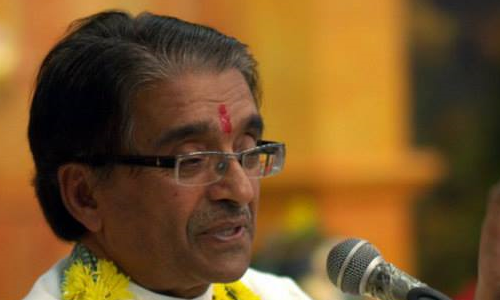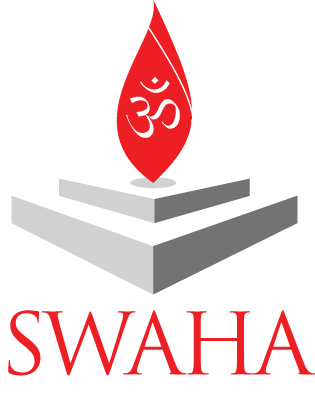Message from Paramacharya Pt. Hardeo Persad
The history of Indian arrival to our country is well-known. It is taught in schools as part of the curriculum; it is celebrated on a national level, as SWAHA is doing today. Nowadays, even the entire month of May is carded for Indian arrival festivities that include everything from displays, competitions, awards and many, many speeches. A lot of talking happens every year, intensifying and culminating on May 30th. It would seem, as a people, we suffer from collective amnesia because the same dates, events, highlights, achievements, hardships are recounted ad nauseam every year. As a people, there must be deeper introspection and reflection. More profound questions must be asked. A more robust level of self-inquiry must happen. Undoubtedly, we have achieved great strides as a people and certainly, a lot has improved over the last 173 years. That is unquestionable and indisputable. But my question is always and will continue to be: have we really arrived?Ask yourself, how have we arrived? How have we changed? How have we improved?
Self-inquiry starts obviously with you, the individual. Only when you are confident in who you are, then can you expand outwards and exact constructive change on the society as a whole. One crucial quality of self-inquiry is that it is an ongoing process; never-ending, always evolving. The day we stop self-inquiry is the day we cease to progress. You see, one cannot expect to change things in the family, the community or the world if one doesn’t change things on the inside. What happens out there is a reflection of what happens in here. As in the macrocosm, so in the microcosm. Like a good teacher and guru, we must be critical with ourselves. Yes, there are many positives that exist. As a people, we raised the bar educationally, materially, socially, intellectually, politically but what about spiritually? How would you assess the spiritual growth of us as a people? How would you measure it?
It may seem cynical and harsh to highlight the ways in which spiritual progress is lacking and long overdue, but I believe we are an intelligent and competent people. We are behind schedule and should do the necessary homework to move beyond the infant, ABC level. I know I am ready to be promoted! How long will we persist at this stage? Shouldn’t we be tackling more pressing issues after 173 years of Indian arrival? Yet, the so-called ‘crab in barrel’ attitude endures and prevails. In-fighting and back-biting reign supreme in families, communities, organisations and the country at large. The individual ego has escaped and is wreaking havoc on all faces of society. Each man fights for himself; he allows his personal agenda to supersede the greater good. Such self-centeredness and vanity still triumph. It is this egomania that blocks and precludes spiritual growth.
When I look at recent happenings surrounding the hijab issue that took place about one week ago, I feel disappointed in us as a people. Hindus attacking Hindus, even within organisations, there is internal friction and to what end? Are we telling the youth that we cannot mediate and come to a consensus on such a simple issue? I agree that it was handled badly and I certainly agree that in this day and age, after 173 years of arrival, we should be more tolerant and respectful. It shouldn’t even happen. However, it did and how did we respond? It is never right to discriminate, full stop. It is even worse to discriminate based on religion, dress, race etc, if indeed this was the case. One must always recognise that there are many sides to one story. Who knows the truth? None of us was present so our reaction should be measured and balanced. SWAHA has defined itself by presenting an enlightened perspective. We are leaders in this realm and as such, our view is sought on many controversies. To whom much is given, much is expected. Leaders are change agents and SWAHA is recognized as a voice of reason in a very confused, chaotic and unreasonable world. There are fundamental laws that should drive our lives. Our reaction to what happens on the outside should be guided by these laws, and not by pettiness, self-aggrandisement or conceit.
Nothing is totally bad or negative. Let’s take the idea of discrimination as an example since the term is being bandied about often nowadays. One should definitely strive towards discrimination but that of a spiritual nature. The quality of spiritual discrimination would help focus our minds on the right type of knowledge and more importantly, the truth. The Ganesha form symbolises such discriminative power that all men need in times of trouble and worry. That vivek or spiritual discrimination cuts across worldly dualities like happiness/sadness, anger/delight, fear/faith, right/wrong. Spiritual discrimination is elemental to going beyond such opposites of this world. This quality enables one to see the true picture or reality and therefore make an informed, just decision that is not based on emotion.
173 years ago, when the FatelRazak docked with the first set of indentured labourers, it is true that they brought a little piece of India with them. Since then, Hindus and Muslims have greatly impacted the cultural and religious landscape of Trinidad and Tobago. My feeling, however, is that after more than one century our conversations should be focused on more burning issues. The crime rate is alarmingly high. Access to standard healthcare is compromised. Many of our schools are in a state of disrepair. We can no longer boast of food security as prime agricultural lands are demolished and used for housing. Wouldn’t time be better spent in discussions about such matters? Our time is already limited here so shouldn’t we use it wisely and constructively? We owe it to both our ancestors and future generations.
No man is an island and by the same token, one’s attitude, behaviour and speech affect those around us. How we behave now specifically impacts the younger ones who are looking on. Their minds are being molded by what is seen, heard and displayed. Our actions and reactions serve as models for them. They glean lessons from real-life stories, and this type of education is very difficult to correct. Once stored in memory, such habits and morals are retrieved in similar situations and so, the same self-interest perpetuates. I urge you to see the bigger picture. I encourage you to consider how your actions and words will impact those around you. What kind of model are you? How are you guiding the young ones?
Most of you know that I encourage you to question and to search for a deeper significance in everything we do. Likewise, I encourage the young ones to query, investigate and analyse everything. Do not accept blindly. We live in the age of knowledge. There is absolutely no excuse for ignorance or arrogance. Ask questions, research, formulate your own ideas and come to your own conclusions. Be mindful though that this knowledge can sometimes be a double-edged sword. This is where introspection and analytical skills come in. Use knowledge to expand your thinking, embrace news ways of seeing and search for the deeper lessons. Always remember that the human form is the highest form, so the onus is on you to use this form to the benefit of all. Time waits on no one so the best time is always now.
For Indian Arrival 2018, I want to urge you to do some solid self-reflection and gauge how far you have progressed at the personal level. Be critical and honest with yourself. Set a goal in mind and take steps towards that goal so that when Indian arrival 2019 comes around, real, authentic spiritual growth can be celebrated. According to Mahatma Gandhi ‘you must be the change you wish to see in the world.’ Change starts with you. Only when this happens can we really proclaim that we have arrived. Only then can we close our eyes, throw caution in the wind and celebrate not only the historicity of Indian arrival but, even better, a true spiritual arrival.

